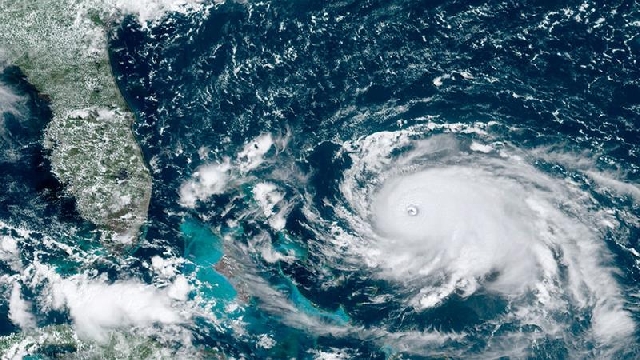Bahamas braces for category five Hurricane Dorian
 Hurricane
Hurricane
Hurricane Dorian has become a category five storm and is expected to hit the Bahamas with devastating winds and very heavy rainfall, forecasters say.
The "extremely dangerous" storm is expected to slam the north-west of the island chain on Sunday, the US National Hurricane Center (NHC) said, before making landfall on the US east coast.
Grand Bahama residents have been evacuating from its predicted path.
The storm surge could be as high as 15ft (4.6m), officials warned.
Authorities closed some airports in the outlying islands, but the main international airport remains open on Sunday.
The storm was on Sunday morning about 35 miles east of the Bahamas' Great Abaco Island, moving westward at 8mph (13km/h) with maximum sustained winds of nearly 160mph (260km/h).
The core of the hurricane was expected to move over the island soon, and continue near or over Grand Bahama later on Sunday and Monday.
After hitting the Bahamas, it was expected to move up the US coast, grazing Florida, which had expected a direct hit but appeared to have been spared the worst by a change in the storm's path.
Dorian's wind speeds put the storm among the most dangerous in recent history. Forecasters warned that it could be the region's worst since the category five Hurricane Andrew killed 65 people and destroyed 63,000 homes in 1992.
US President Donald Trump said he was monitoring Dorian, which he described as "an extremely dangerous storm" on Twitter. He cancelled a planned trip to Poland, sending Vice-President Mike Pence in his place.
Hurricanes, which vary in strength from category one to five on the Saffir-Simpson scale, tend to get stronger as they move over warm waters like those off the coast of Florida.
Forecasters said they expected Dorian to shift eastwards around the middle of the week, putting the coasts of Georgia and South Carolina at risk.
As storm slows, danger increasesThe NHC said "life-threatening storm surge, devastating hurricane-force winds, and heavy rains capable of life-threatening flash floods" were expected to hit the Abaco Islands and Grand Bahama on Sunday.
The country's National Emergency Management Agency said it believed that the damage might be exacerbated by an expected slowing in the storm's movement, keeping it over the islands for longer.
A tropical storm watch was also in effect for a 120-mile (193km) stretch of Florida's eastern coast, with hurricane-force winds possible along the coast by early next week.
Dorian's exact path remained uncertain but millions were at risk, as well as holiday attractions such as Walt Disney World and President Trump's Mar-a-Lago resort.
How is the Bahamas preparing?Bahamas Prime Minister Hubert Minnis announced an evacuation order for parts of Grand Bahama and the Abaco Islands, both in the north of the archipelago. All tourists were asked to leave the islands.
At a news conference, Mr Minnis begged residents to head for the main island to escape the "devastating, dangerous storm".
"I want you to remember: homes, houses, structures can be replaced. Lives cannot be replaced," he said, adding that 73,000 people and 21,000 homes were at risk.
In Florida, Governor Ron DeSantis declared a state of emergency for the whole state and activated 2,500 National Guard troops with another 1,500 on standby.
Shoppers in Florida were seen queuing around blocks to buy supplies such as medication and fuel. The coastal city of Miami ordered the removal of electric rental scooters from the streets to avoid them becoming projectiles.
Source: BBC
Trending News

New train crashes on test run
20:35
Alan launches Alliance for Revolutionary Change (ARC) today
06:02
Engineering Council disgusted by Ashanti ECG MD's arrest on minister's orders
11:20
Bawumia visits Madina market Friday
15:23
Ameri name tainted with NDC’s corruption-NPP
17:04
2024 World Earth Day: Reduce production of all forms of plastic to 60% by 2040 – CCLG-Africa to gov’t’s
10:44
Adu-Ampomah & Amoah know Lithovit is liquid fertiliser – COCOBOD RM&E Dir. tells court
10:26
Man allegedly shoots wife in Adaklu
15:01
Ashanti NDC condemns renaming of Ameri Power Plant
16:55
IMF: Failure to agree Eurobond deal 'won't stop us from providing more financing to Ghana'
08:41



